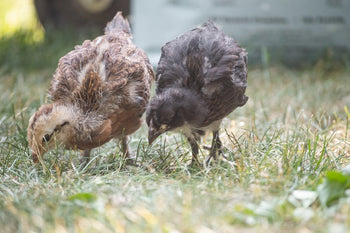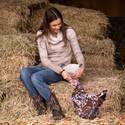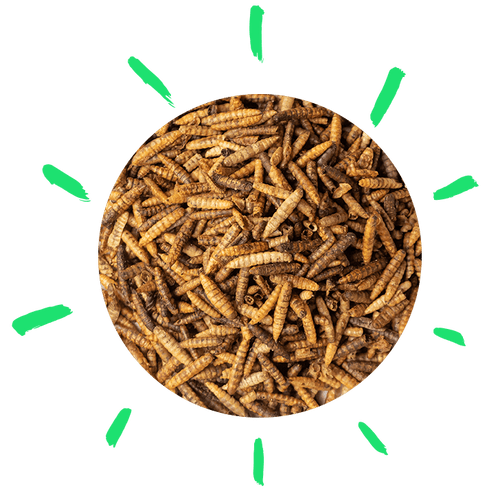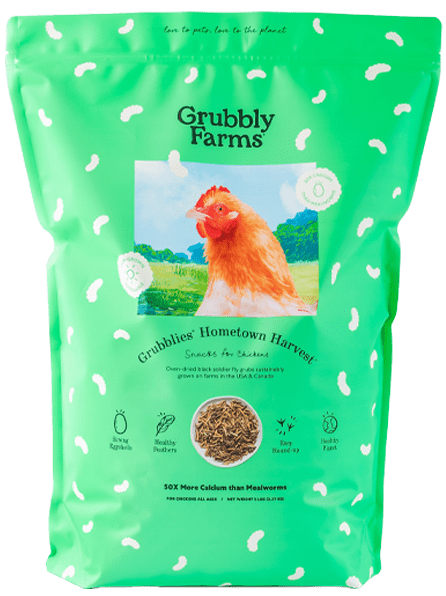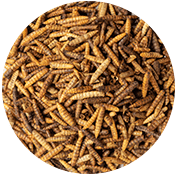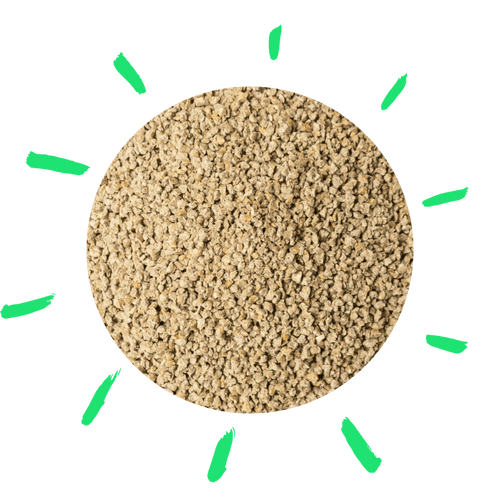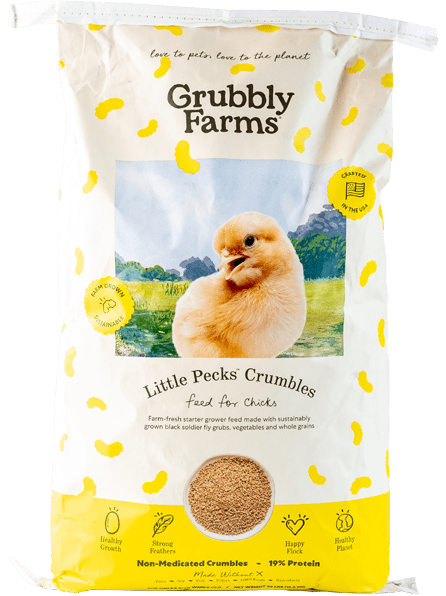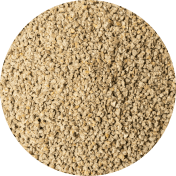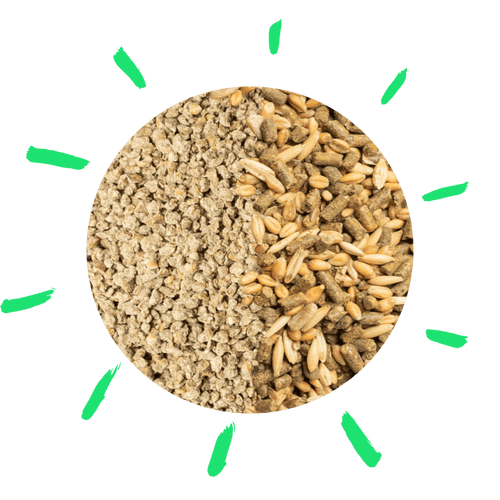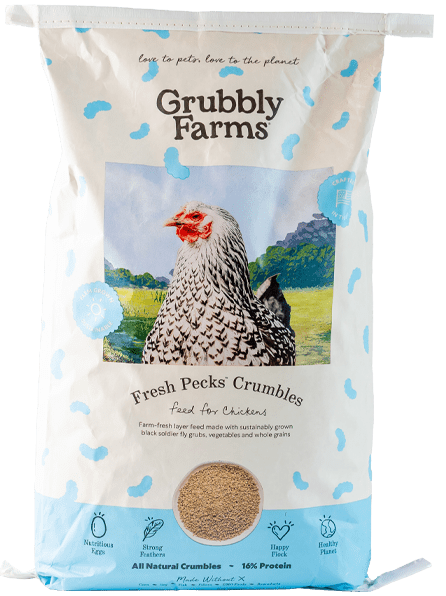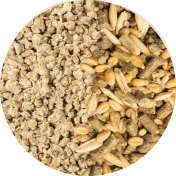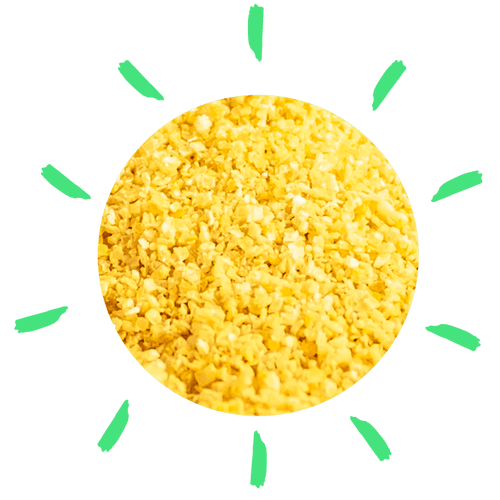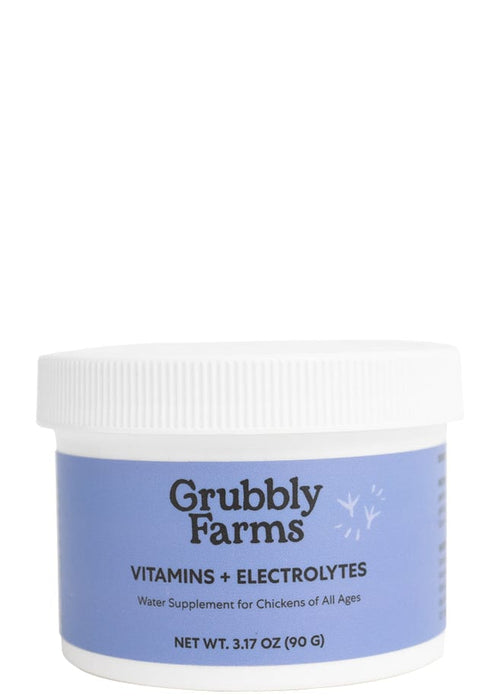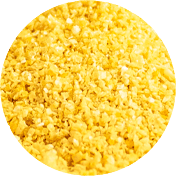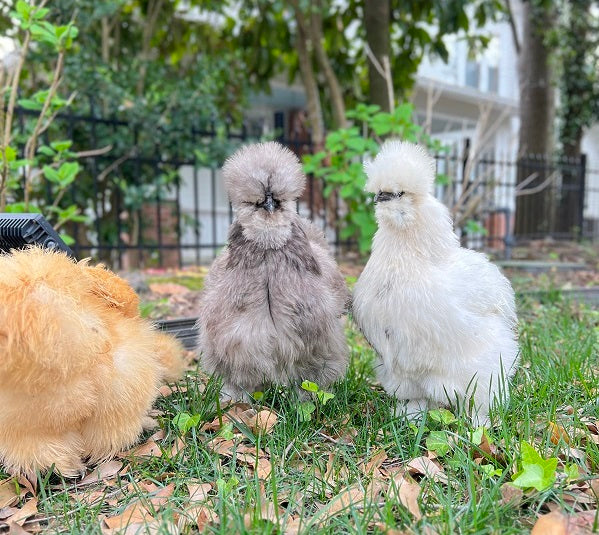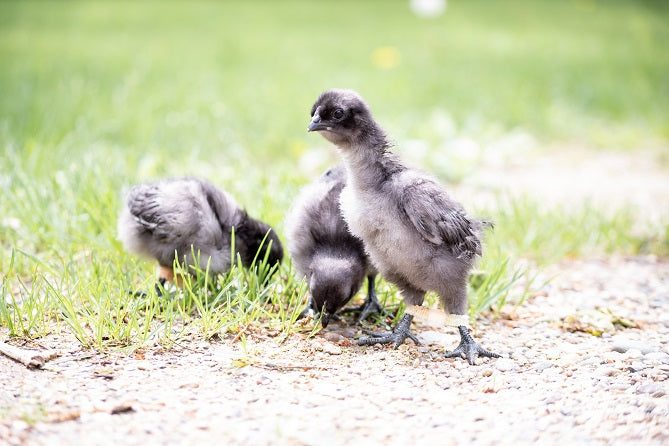Coccidiosis is a common poultry ailment. It is a protozoa parasite that is naturally present in the environment. Chickens must build up immunity to the protozoa to avoid infection. Understanding how this poultry parasite affects chickens is essential for raising a healthy brood of chicks and maintaining your adult flock's health. This informative guide on coccidiosis will help you recognize coccidiosis symptoms, diagnose the parasite, treat the ailment, and prevent coccidiosis from becoming an ongoing issue in your flock.
What is Coccidiosis?
Coccidiosis is a protozoa parasite that destroys the lining of a chicken’s intestines. It causes damaged intestines, resulting in malnutrition. In serious cases, the damage caused by the parasite may be irreparable and lead to death.
Coccidiosis is a common poultry disease because the parasite is naturally present in any environment where chickens are raised. Even healthy chickens have a small population of the coccidia parasite living in their gut. But this small population is kept in check by a chicken’s immune system. Healthy chickens build up immunity to the coccidia parasite, which prevents infection.
Natural immunity to coccidiosis must be built up through gradual exposure to the parasite. Exposing chicks at a young age helps them build immunity to the parasite as they grow and mature.
The Culprit: Coccidia Parasites
The coccidia parasite causes coccidiosis. These microscopic parasites live in a chicken’s intestinal tract. The Eimeria protozoa is the main coccidia parasite that causes coccidiosis in chickens.
The coccidia parasite has many different species that affect nearly all types of livestock. However, each coccidia parasite is highly species-specific. The species of coccidia protozoa that infects chickens will not infect other livestock, pets, or even other species of poultry.
There are nine species of coccidia protozoa that infect chickens. Each coccidia protozoa targets a different area of a chicken’s intestine. A chicken can be infected by multiple types of coccidia parasite at one time.
Here are the nine common species of coccidia protozoa:
- E. acervulina: most common coccidia protozoa, usually infects chicks between two to four weeks of age
- E. brunetti: uncommon, typically infects birds reaching the age of maturity
- E. hagani: uncommon coccidia protozoa
- E. maxima: common, infects chicks between three to five weeks of age
- E. mitis: common, infects chickens of any age
- E. mivati: common coccidia protozoa, infects chicks between three to five weeks of age
- E. necatrix: common, infects birds reaching maturity
- E. praecox: uncommon, infects chicks between three to five weeks of age
- E. tenella: common, infects chicks between four to six weeks of age
While most coccidia protozoa infect different parts of a chicken’s intestines, E. tenella is an exception. This protozoa infects a chicken’s ceca.
Coccidiosis is spread through coccidia oocysts in the environment. These oocysts can live in soil, litter, feed, or water. They can be spread by other chickens, rodents, insects, people, or even through air-blown dust and debris. The coccidia life cycle is very rapid, often taking a week or less for an infection to spread.
The coccidia life cycle starts when an infected chicken poops out coccidia oocysts, which are the coccidia parasite’s fertilized egg cysts. At first, the fresh oocysts are noninfective. They must develop and sporulate in order to become infective. Sporulation only takes a day or two, but the oocysts must be exposed to the correct conditions for this process to occur.
Coccidia oocysts need a moist, warm environment in order to develop. A temperature range between 70 to 90°F is ideal for coccidia oocyst sporulation. Once sporulated, the infective oocysts can remain in the environment for many months. Infective oocysts can only be destroyed in the environment by freezing temperatures or extreme heat and dry conditions. A temperature above 130°F is required to kill infective coccidia oocysts.
Chicken ingest sporulated oocysts when they consume contaminated feed, water, or by pecking at the ground. Once ingested, the infective oocysts are crushed by the chicken’s gizzard. This releases four internal cysts. When the cysts reach the chicken’s duodenum (part of a chicken’s digestive tract), the digestive enzymes break down the cysts to release zoites.
The zoites then invade a chicken’s intestines. Once in the intestines, the zoites proliferate and start to asexually reproduce. The zoites eventually develop into sexually reproducing protozoa that can create thousands more oocysts.
The protozoa feed off of a chicken’s intestines as they create more oocysts to continue the protozoan life cycle.
How Does Coccidiosis Affect Your Chickens?
Chickens will naturally be exposed to and consume coccidia oocysts from their environment. But they become actively infected by the parasite if they haven’t built up natural immunity. A coccidiosis infection causes damage to a chicken’s intestines, impacts growth rates and production, and can lead to secondary infections.
Coccidiosis commonly affects young chickens between three and six weeks of age. Chicks younger than three weeks of age typically aren’t exposed to enough infective oocysts to become infected. Chicks older than six weeks should have a natural immunity built up to the protozoa. Any chick with a compromised immune system will be more susceptible to coccidiosis than a healthy chick with a strong immune system. A chick with chronic diseases or Marek’s disease is more susceptible to coccidiosis.
Coccidiosis can also infect adult chickens. Adult chickens are more susceptible to coccidiosis when their immune system is suppressed due to other diseases, parasites, or stress. An adult chicken can build up immunity to one species of coccidia protozoa but be susceptible to infection by a different coccidia species that it hasn’t previously been exposed to.
A chicken must start building immunity to coccidiosis at a young age. Helping your chicks develop a strong immune system between one and three weeks of age can help them build up immunity to coccidiosis before it becomes infective in the brooder. A chick develops natural immunity to coccidiosis by ingesting small amounts of oocysts, stimulating active immunity if a chick’s immune system is strong.

The Toll on Poultry
- Intestinal Damage: The coccidia protozoa causes intestinal damage as the mature protozoa feeds off of the lining of a chicken’s intestine. Intestinal damage prevents the proper functioning of the intestines. When the intestines don't function properly, a chicken cannot absorb nutrients from the foods it consumes. This lack of nutrient extraction and absorption leads to malnutrition. Severe damage to the intestines results in hemorrhaging in the intestines and eventually death.
- Growth & Egg Production: When a chicken is not receiving the nutrition it needs from its diet, other body functions are also harmed. Chicks will not be able to grow properly or mature without the proper nutrients from their diet. Even just a minor coccidiosis infection can lead to stunted growth in young chickens due to malnutrition. A coccidiosis infection in adults or birds just reaching maturity can lead to a decrease or halt in egg production. A hen with malnutrition due to damaged intestines will not have the nutrition she needs to produce eggs.
- Secondary Infections: A coccidiosis infection usually means the immune system is weakened. A weakened immune system makes a chicken more susceptible to other diseases and parasites. Since the gut is already compromised by the coccidia parasite, it makes a chicken especially susceptible to other intestinal diseases and parasites, such as salmonella or E. coli.
Recognizing Symptoms of Coccidiosis
Different species of coccidia cause chickens to exhibit different symptoms. However, some coccidiosis symptoms are shared across all coccidia species. Here are some common ones:
- Diarrhea: Bloody or watery diarrhea is a prominent sign of a coccidiosis infection. Whitish diarrhea is a common indication of the coccidia protozoa E. acervulina.
- Lethargy & Poor Appetite: Chicks or chickens may appear weak and lose interest in eating. They will also drink less and suffer from dehydration and malnutrition.
- Ruffled Feathers & Huddling: Weakness due to malnutrition causes a chicken to exhibit symptoms such as standing huddled with ruffled feathers. Its comb and wattles may also appear pale, shriveled, and shrunken. An ailing chicken will show signs of discomfort and may try to isolate itself from the rest of the flock.
Some coccidiosis symptoms are age specific. While any age chicken can exhibit the above symptoms, the following symptoms are more age specific depending on if the chicken is young or mature.
- Growing Chicks: Slow growth, severe diarrhea, numerous deaths
- Mature Chickens: Slow or no egg production, loss of pigment in skin and shanks but not laying, weight loss
Diagnosing Coccidiosis (Confirming the Culprit)
Coccidiosis can usually be diagnosed by watching for symptoms of a coccidiosis infection. Varying levels of infection can cause different degrees of symptoms.
An acute coccidiosis infection is the severest level of infection and causes extremely bloody diarrhea and rapid death. Chronic coccidiosis is a milder degree of infection.
A chicken infected with chronic coccidiosis may not even exhibit symptoms other than failure to thrive, grow, or reproduce. Coccidiosis is the term used to refer to the level of infection a chicken has once it has built up immunity to coccidiosis. The coccidia parasite still lives in the chicken’s gut, but the chicken’s immune system keeps the parasite from becoming infected.
If you are unsure if your chicken has coccidiosis, you can always consult an avian expert or a veterinarian who deals with poultry. A veterinarian may be able to diagnose what level of coccidiosis infection your flock or brood is experiencing, and which species of the parasite is the main culprit.
Additionally, a fecal float test can also help you diagnose coccidiosis in your flock. In order to do a fecal float test you must gather a feces sample from the bird or birds whom you suspect are infected with coccidiosis. You can either take the sample to a veterinarian to perform the test or buy at-home fecal float test kits to perform the test yourself.
A fecal float test involves mixing chicken poop with a liquid that has a specific gravity greater than the coccidia parasite eggs but less than other fecal matter. This helps separate and concentrate any parasite eggs in the fecal matter, leading to the correct diagnosis and identification of the parasite eggs. A fecal float test reveals if a chicken is shedding coccidia oocysts and helps identify which species of protozoa is causing an infection.

Preventing Coccidiosis
The coccidia parasite cannot be completely eliminated from the natural environment. Chickens are inherently exposed to coccidiosis. The best way to prevent your chickens from becoming infected with coccidiosis is through proper management and preventative measures.
Exposure to coccidiosis must be properly controlled. Chickens can best build up immunity to the parasite through low exposure to avoid becoming infected by high concentrations of infective oocysts. Here are some ways you can help prevent an active coccidiosis infection in your backyard flock:
Good Management
You can prevent coccidiosis from becoming an issue in your flock through proper management practices. Ensuring your flock has a balanced and nutritious diet is a great place to start. Deficiencies in vitamins A, E, and K as well as selenium can make chicks and chickens more susceptible to coccidiosis. Fresh feed that provides your flock with all the nutrition they need should be supplied on a daily basis and balanced with healthy snacks and occasional treats. Water supplements can also be incorporated to ensure that your flock is supported during stressful periods, such as heat waves.
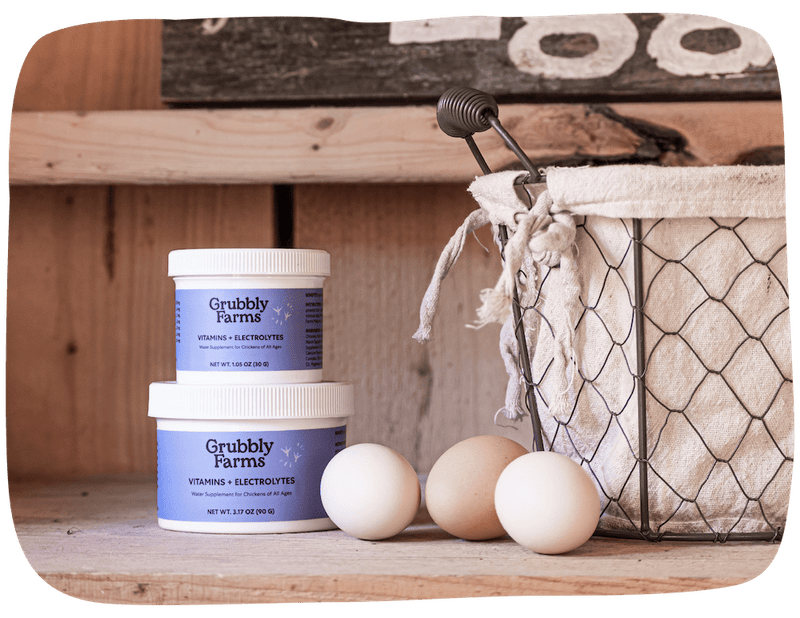
Vitamins + Electrolytes
Protect Your Flock All Year Long
Vitamins + Electrolytes is a powdered water supplement formulated to support health, wellness & hydration throughout all seasons. It helps during heat waves or other times of stress.
Shop NowYou should also prevent overcrowding in the brooder, chicken coop, and chicken run. Overcrowding makes it harder to keep the chicken coop or brooder clean. It also causes stress among chicks and chickens, which suppresses the immune system and could make chickens more susceptible to coccidiosis.
If possible, move chicks out of the brooder once they reach three weeks of age. Coccidia oocysts need time to build up in the brooder, and they usually reach peak levels around three weeks. Moving your chicks out of the brooder or replacing all of the brooder litter can help reduce the levels of oocysts.
Take measures to control the coccidia oocyst population in the natural environment where your chickens live. Keep in mind that a small number of oocysts present in the environment is necessary in order for chickens to build up gradual immunity. However, a high concentration of oocysts can lead to infection, which should be avoided. While you can’t see the oocysts in the environment since they are microscopic, practice good biosecurity to help prevent them from getting out of control.
Sanitize the Coop & Brooder
Clean the chicken coop or the brooder on a daily basis. Make sure the litter stays dry and that droppings don’t build up in the coop or brooder. If you use large flake wood shavings or straw as litter, encourage litter composting. When the droppings and litter start to break down, the helpful compost bacteria destroy coccidia oocysts.
Whenever you do a thorough cleaning of the chicken coop or brooder, sanitize as many surfaces as you can. A clean, dry, and well-ventilated chicken coop and brooder can prevent coccidia oocysts from building up.
Outdoor Exposure
Giving chicks access to the outdoors starting at a young age is a great way to help them build up immunity to the coccidia in their natural environment. Free-range and pasture-raised chicks build up immunity to coccidiosis faster than chicks raised in a confined environment or limited area. The less space chicks have, the higher concentration of oocysts they are exposed to. Take your chicks outside on warm, sunny days and let them peck around in the grass and dirt. This gradual exposure to limited amounts of natural coccidia will help them build up immunity to coccidiosis.
Improving Hygiene
Keep your flock’s feed and water clean. Dirty litter and chicken poop can contaminate your flock’s feed and water sources, spreading coccidia oocysts at the same time. Refresh your flock’s water daily to make sure it stays clean. Prevent water spills from moistening the litter in the chicken coop and brooder.
Hanging feed and water systems are effective at keeping dirt or poop from being kicked into the feeder or water. You should also take measures to prevent chicks or chickens from roosting on top of or above their feeder and water. Clean feed and water will prevent the spread of coccidiosis through contaminated feces.
Treating Coccidiosis
A severe coccidiosis infection may spread so quickly that treatment will be hard to implement fast enough. However, if you catch the infection early on, you can halt the infection before it becomes severe. Here are some measures to take when treating a coccidiosis outbreak:
Isolate Infected Birds
If you suspect one or more of your chickens has coccidiosis, isolate the infected chickens from the rest of your flock. Coccidiosis does not generally infect all the chickens in a flock at the same time. Separating out the sick chickens and thoroughly cleaning the coop or brooder can help prevent the infection from spreading. If possible, move the healthy chickens into a different run or onto a different pasture so that they don’t become infected by contaminated droppings.
Coccidiosis is a self-limiting disease. That means that infected chickens can recover within a few weeks with or without treatment. For severe cases of coccidiosis, infected chickens will need to be treated in order to make a full recovery. Keep sick chickens away from the rest of your flock until they no longer exhibit symptoms of a coccidiosis infection.
Veterinarian Treatment
Regardless of severity, you may consider prescribed treatment for coccidiosis. Medicating infected chickens will minimize the amount of coccidia oocysts expelled in their droppings. This self-limits the parasite faster, prevents the spread of the infection, and reduces the chance of reinfection.
Medication can also minimize intestinal damage, relieve diarrhea to prevent dehydration, and prevent secondary infections from setting in. However, anticoccidial drugs are not an alternative to good management. They simply help control an infection to prevent it from becoming serious and fatal.
Conclusion
Coccidiosis is a common poultry disease, so it's important to recognize, prevent, and control coccidiosis in your backyard flock. Learning how to manage your flock’s exposure to coccidiosis can help them build up gradual immunity to the disease and ultimately stay healthy. Coccidiosis is most common in young chicks. However, with good management, a clean brooder, and a nutritious diet, you can raise a healthy brood of chicks without having to worry about coccidiosis! Remember, you should always seek professional veterinary help if you suspect your chicks or chickens have a serious coccidiosis infection.
Source(s):
Damerow, Gail. The Chicken Health Handbook: A Complete Guide to Maximizing Flock Health & Dealing with Disease. Storey Publishing, 2015





